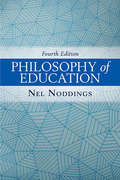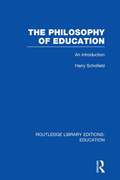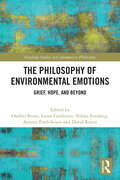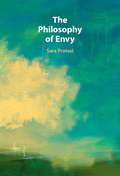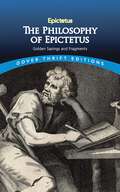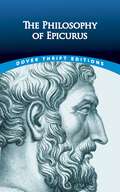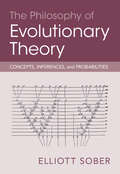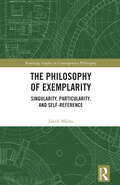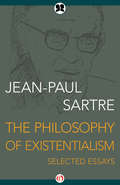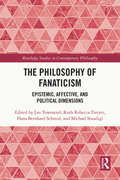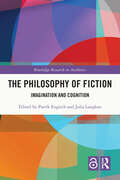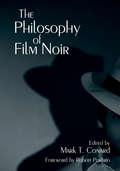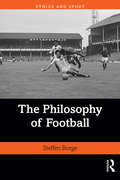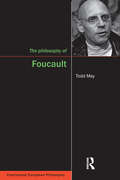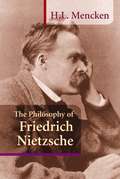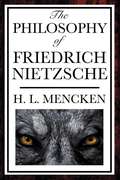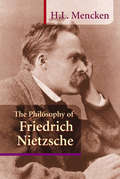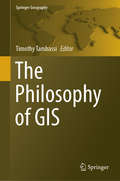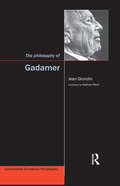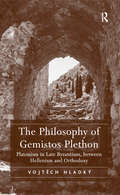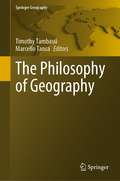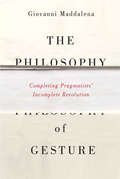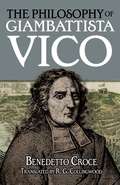- Table View
- List View
The Philosophy of Education
by Nel NoddingsThe first edition of Nel Noddings' Philosophy of Education was acclaimed as the "best overview in the field" by the journal Teaching Philosophy and predicted to "become the standard textbook in philosophy of education" by Educational Theory. This classic text, originally designed to give the education student a comprehensive look at philosophical thought in relation to teaching, learning, research, and educational policy, has now been updated to reflect the most current thinking in the field. A revised chapter on Logic and Critical Thinking makes the topic more accessible to students and examines how critical thinking plays a role in light of the new Common Core standards. Philosophy of Education introduces students to the evolution of educational thought, from the founding fathers to contemporary theorists, with consideration of both analytic and continental traditions. This is an essential text not only for teachers and future teachers, but also for anyone needing a survey of contemporary trends in philosophy of education.
The Philosophy of Education
by NoddingsThe first edition of Nel Noddings’ Philosophy of Education was acclaimed as the "best overview in the field” by the journal Teaching Philosophy and predicted to "become the standard textbook in philosophy of education” by Educational Theory. This classic text, originally designed to give the education student a comprehensive look at philosophical thought in relation to teaching, learning, research, and educational policy, has now been updated to reflect the most current thinking in the field. A revised chapter on Logic and Critical Thinking makes the topic more accessible to students and examines how critical thinking plays a role in light of the new Common Core standards. Philosophy of Education introduces students to the evolution of educational thought, from the founding fathers to contemporary theorists, with consideration of both analytic and continental traditions. This is an essential text not only for teachers and future teachers, but also for anyone needing a survey of contemporary trends in philosophy of education.
The Philosophy of Education: An Introduction (Routledge Library Editions: Education)
by Harry SchofieldThere are many students who find philosophy of education difficult, because they have never received teaching in the basic essentials of general philosophy. This book begins by asking the basic question ‘what is philosophy?’ and examines a number of possible answers. Step by step the reader is introduced to the modern techniques of linguistic and concept analysis. Whenever a technical term is used it is explained and illustrated by reference to familiar situations in everyday life.
The Philosophy of Environmental Emotions: Grief, Hope, and Beyond (Routledge Studies in Contemporary Philosophy)
by Niklas Forsberg Laura Candiotto Ondřej Beran Antony Fredriksson David RozenThis volume presents new philosophical perspectives on environmental emotions. It explores the motivating nature of emotions such as anger, grief, and hope in relation to the current climate crisis.Many of our emotional responses to the climate crisis take a distressed form like anxiety, despair, or grief. However, these emotions almost always coexist with hope, a drive toward action, or a strengthened sense of relationality and belonging. This book explores the different levels at which these tensions take place. Part I discusses the conceptual and linguistic notions we use to make sense of our ecological predicament. Part II looks at the embedded dimension of our emotions: how we feel about the climate crisis as members of our communities and how our emotions are interconnected with what we do and how we work in and for our communities. Several chapters in this section explicitly discuss hope. Finally, Part III has a phenomenological and existential focus: it explores the nature of the rootedness and how it shapes our emotional experiences during the climate crisis.The Philosophy of Environmental Emotions will appeal to scholars and graduate students working in environmental philosophy, philosophy of emotion, and environmental psychology.
The Philosophy of Envy
by Sara ProtasiEnvy is almost universally condemned and feared. But is its bad reputation always warranted? In this book, Sara Protasi argues that envy is more multifaceted than it seems, and that some varieties of it can be productive and even virtuous. Protasi brings together empirical evidence and philosophical research to generate a novel view according to which there are four kinds of envy: emulative, inert, aggressive, and spiteful. For each kind, she individuates different situational antecedents, phenomenological expressions, motivational tendencies, and behavioral outputs. She then develops the normative implications of this taxonomy from a moral and prudential perspective, in the domain of personal loving relationships, and in the political sphere. A historical appendix completes the book. Through a careful and comprehensive investigation of envy's complexity, and its multifarious implications for human relations and human value, The Philosophy of Envy surprisingly reveals that envy plays a crucial role in safeguarding our happiness.
The Philosophy of Epictetus: Golden Sayings and Fragments
by Epictetus"Wealth consists not in having great possessions, but in having few wants.""There is only one way to happiness and that is to cease worrying about things which are beyond the power of our will.""Is there smoke in the room? If it be slight, I remain; if grievous, I quit it. For you must remember this and hold it fast, that the door stands open."A leading thinker of the Stoic school of philosophy, Epictetus (A.D. 55–135) was a renowned teacher whose students transcribed and compiled his teachings; this collection presents the work of Arrian, a Greek philosopher and historian who was a disciple of Epictetus. In these two brief but highly influential works, Epictetus demonstrates that philosophy is more than a theoretical discipline; it is a way of life based on logic, reason, and self-reflection. His examination of the nature of fate and man's place in the universe explores the distinction between what is and is not within our power, the meaning of good and evil, how we should live, and many other timeless issues.
The Philosophy of Epicurus: Letters, Doctrines, And Parallel Passages From Lucretius (Dover Thrift Editions)
by EpicurusDespite its modern-day connotations of hedonism, "Epicureanism" has more to do with living a mindful, uncomplicated life. Epicurus — who was born at Samos, Greece, in 341 BC and died at Athens in 270 BC — founded a school of philosophy that focused on maximizing simple pleasures and minimizing pain, such as the irrational fear of death. "Death is nothing to us," declared Epicurus, "since when we are, death has not come, and when death has come, we are not." The philosopher did not believe that humans would be punished for their sins after death, and he stressed the lifelong search for lasting pleasures: tranquility, friendship, and philosophical inquiry. Although Epicurus was a prolific author, very few of his writings have survived. This volume, edited and translated by George K. Strodach, features three important letters and a collection of observations preserved by the biographer of ancient philosophers, Diogenes Laertius. Students of philosophy and ancient history will appreciate this compilation of Epicurus's enduring wisdom.
The Philosophy of Evolutionary Theory: Concepts, Inferences, and Probabilities
by Elliott SoberNatural selection, mutation, and adaptation are well-known and central topics in Darwin's theory of evolution and in the 20th - and 21st -century theories which grew out of it, but many other important topics are used in evolutionary biology that raise interesting philosophical questions. In this book, Elliott Sober analyses a much larger range of topics, including fitness, altruism, common ancestry, chance, taxonomy, phylogenetic inference, operationalism, reductionism, conventionalism, null hypotheses and default reasoning, instrumentalism versus realism, hypothetico-deductivism, essentialism, falsifiability, the principle of parsimony, the principle of the common cause, causality, determinism versus indeterminism, sensitivity to initial conditions, and the knowability of the past. Sober's clear philosophical analyses of these key concepts, arguments, and methods of inference will be valuable for all readers who want to understand evolutionary biology in both its Darwinian and its contemporary forms.
The Philosophy of Exemplarity: Singularity, Particularity, and Self-Reference (Routledge Studies in Contemporary Philosophy)
by Jakub MáchaThis book offers an original philosophical perspective on exemplarity. Inspired by Wittgenstein’s later work and Derrida’s theory of deconstruction, it argues that examples are not static entities but rather oscillate between singular and universal moments. There is a broad consensus that exemplary cases mediate between singular instances and universal concepts or norms. In the first part of the book, Mácha contends that there is a kind of différance between singular examples and general exemplars or paradigms. Every example is, in part, also an exemplar, and vice versa. Furthermore, he develops a paracomplete approach to the logic of exemplarity, which allows us to say of an exemplar of X neither that it is an X nor that it is not an X. This paradox is structurally isomorphic to Russell’s paradox and can be addressed in similar ways. In the second part of the book, Mácha presents four historical studies that exemplify the ideas developed in the first part. This part begins with Plato’s Forms, understood as standards/paradigms, before considering Kant’s theory of reflective judgment as a general epistemological account of exemplarity. This is then followed by analyses of Hegel’s conceptual moment of particularity and Kuhn’s concept of paradigm. The book concludes by discussing the speculative hypothesis that all our knowledge is based on paradigms, which, following the logic of exemplarity, are neither true nor false. The Philosophy of Exemplarity will be of interest to scholars and advanced students working in philosophy of language, logic, history of philosophy, and literary theory.
The Philosophy of Existentialism
by Jean-Paul SartreA collection of essays by Jean-Paul Sartre that touch upon the subject of existentialism by looking at aesthetics, emotions, writing, phenomenology, and perception The Philosophy of Existentialism collects representative essays on Jean-Paul Sartre's pioneering subject: existentialism. Beginning with a thoughtful introduction by fellow French philosopher Jean Wahl, this worklooks at existentialism through several lenses, exploring topics such as the emotions, imagination, nothingness, freedom, responsibility, and the desire to be God. By providing exposition on a variety of subjects, The Philosophy of Existentialism is a valuable introduction to Sartre's ideas.
The Philosophy of Fanaticism: Epistemic, Affective, and Political Dimensions (Routledge Studies in Contemporary Philosophy)
by Leo TownsendThe essays in this volume explore some of the disconcerting realities of fanaticism, by analyzing its unique dynamics, and considering how it can be productively confronted. The book features both analytic and continental philosophical approaches to fanaticism. Working at the intersections of epistemology, philosophy of emotions, political philosophy, and philosophy of religion, the contributors address a range of questions related to this increasingly relevant, yet widely neglected topic. What are the distinctive features of fanaticism? What are its causes, motivations, and reasons? In what ways, if at all, is fanaticism epistemically, ethically, and politically problematic? And how can fanaticism be combatted or curtailed? The Philosophy of Fanaticism will be of interest to scholars and advanced students working in epistemology, philosophy of religion, philosophy of emotions, moral psychology, and political philosophy.
The Philosophy of Fiction: Imagination and Cognition (Routledge Research in Aesthetics)
by Patrik Engisch Julia LangkauThis book presents new research on the crucial role that imagination plays in contemporary philosophy of fiction. The first part of the book challenges the main paradigm set by Kendall Walton and Gregory Currie, according to which there is a necessary connection between fiction and a prescription that we engage imaginatively with its content. The contributors address the fundamental questions of how we can define fiction, and especially whether we can define fiction in terms of imagination. The second part focuses on a distinct but related question: can we point to some distinctive experiential features of our engagement with fiction? In the third part, the focus lies on the cognitive value of fiction and on the role that imagination plays in that respect. The chapters in this part discuss the cognitive value of fiction with respect to issues such as the training of the faculty of imagination, phenomenal experience, empathy, and the emotions. The Philosophy of Fiction will be of interest to scholars and advanced students working in aesthetics, philosophy of mind, epistemology, and literary studies. Chapter 13 of this book is available for free in PDF format as Open Access from the individual product page at www.routledge.com. It has been made available under a Creative Commons Attribution-Non Commercial-No Derivatives 4.0 license.
The Philosophy of Film Noir (The Philosophy of Popular Culture #Ppcs)
by Mark T. ConardAn essay collection examining the philosophical elements of select films in noir cinema, as well as the genre’s legacy in film and culture.A drifter with no name and no past, driven purely by desire, is convinced by a beautiful woman to murder her husband. A hard-drinking detective down on his luck becomes involved with a gang of criminals in pursuit of a priceless artifact. The stories are at once romantic, pessimistic, filled with anxiety and a sense of alienation, and they define the essence of film noir. Noir emerged as a prominent American film genre in the early 1940s, distinguishable by its use of unusual lighting, sinister plots, mysterious characters, and dark themes. From The Maltese Falcon (1941) to Touch of Evil (1958), films from this classic period reflect an atmosphere of corruption and social decay that attracted such accomplished directors as John Huston, Alfred Hitchcock, Billy Wilder, and Orson Welles.The Philosophy of Film Noir is the first volume to focus exclusively on the philosophical underpinnings of these iconic films. Drawing on the work of diverse thinkers, from the French existentialist Albert Camus to the Frankurt school theorists Max Horkheimer and Theodor Adorno, the volume connects film noir to the philosophical questions of a modern, often nihilistic, world. Opening with an examination of what constitutes noir cinema, the book interprets the philosophical elements consistently present in the films—themes such as moral ambiguity, reason versus passion, and pessimism. The contributors to the volume also argue that the essence and elements of noir have fundamentally influenced movies outside of the traditional noir period. Neo-noir films such as Pulp Fiction (1994), Fight Club (1999), and Memento (2000) have reintroduced the genre to a contemporary audience. As they assess the concepts present in individual films, the contributors also illuminate and explore the philosophical themes that surface in popular culture.A close examination of one of the most significant artistic movements of the twentieth century, The Philosophy of Film Noir reinvigorates an intellectual discussion at the intersection of popular culture and philosophy.Praise for The Philosophy of Film Noir“The essays work both as solid primers into philosophy, stretching from Aristotle to Schopenhauer, and as lucid excursions into the genre’s dark, mean streets. . . . A fascinating, readable, and provocative book. . . . Highly recommended.” —Choice“Dense and intriguing, the book suggests noir is best perceived as a slightly warped mirror held up to contemporary society.” —Publishers Weekly
The Philosophy of Football (Ethics and Sport)
by Steffen BorgeHuman beings are the only creatures known to engage in sport. We are sporting animals, and our favourite pastime of football is the biggest sport spectacle on earth. The Philosophy of Football presents the first sustained, in-depth philosophical investigation of the phenomenon of football. In explaining the complex nature of football, the book draws on literature in sociology, history, psychology and beyond, offering real-life examples of footballing actions alongside illuminating thought experiments. The book is organized around four main themes considering the character, nature, analysis and aesthetics of football. It discusses football as an extra-ordinary, unnecessary, rule-based, competitive, skill-based physical activity, articulated as a social (as opposed to natural) kind that is fictional in character, and where fairness or fair play – contrary to much sport ethical discussion – is not centre stage. Football, it is argued, is a constructive- destructive contact sport and, in comparison to other sports, is lower scoring and more affected by chance. The latter presents to its spectators a more unpredictable game and a darker, more complex and denser drama to enjoy. The Philosophy of Football deepens our understanding of the familiar features of the game, offering novel interpretations on what football is, how and why we play it, and what the game offers its followers that makes us so eagerly await match day. This is essential reading for anybody with an interest in the world’s most popular game or in the philosophical or social study of sport.
The Philosophy of Foucault (Continental European Philosophy Ser. #8)
by Todd MayMichel Foucault's historical and philosophical investigations have gone through many phases: the archaeological, the genealogical, and the ethical among them. What remains constant, however, is the question that motivates them: who are we? Todd May follows Foucault's itinerary from his early history of madness to his posthumously published College de France lectures and shows how the question of who we are shifts and changes but remains constantly at or just below the surface of his writings. By approaching Foucault's work in this way, May is able to offer readers an engaging and illuminating way to understand Foucault. Each of Foucault's key works - "Madness and Civilization," "The Archaeology of Knowledge," "The Order of Things," "Discipline and Punish" and the multi-volume "History of Sexuality" - are examined in detail and situated in an historical context that makes effective use of comparisons with other thinkers such as Freud, Nietzsche and Sartre. Throughout this book May strikes a balance between sympathetic presentation and criticism of Foucault's ideas and in so doing exposes Foucault's contributions of lasting value. "The Philosophy of Foucault" is an accessible and stimulating introduction to one of the most popular and influential thinkers of recent years and will be welcomed by students studying Foucault as part of politics, sociology, history and philosophy courses.
The Philosophy of Friedrich Nietzsche
by H. L. MenckenFirst published in 1908, this book, one of Mencken's earliest and the first book on Nietzsche to appear in English, consists of a brief biographical sketch followed by explanations of Nietzsche's basic concepts and attitudes. This edition contains explanatory notes and a new introduction on the similarities between Nietzsche and Mencken and the reasons that Nietzsche is so often misinterpreted.
The Philosophy of Friedrich Nietzsche
by H. L. MenckenThe book covers both wider and lesser known areas of Friedrich Nietzsche's life and philosophy, notable both for its suggestion of Mencken's still-developing literary talents at the age of 27 and for its impressive detail as a book written in the United States (on only the seventh year of Nietzsche's death) considering the lack of reliable interpretations of Nietzsche in the American sphere of letters at the time; Mencken prepared for writing this book by reading all of Nietzsche's published philosophy, including several works in the original German.
The Philosophy of Friedrich Nietzsche
by H. L. MenckenThe first book on Nietzsche ever to appear in English, this examination by legendary journalist H. L. Mencken is still one of the most enlightening. Mencken wrote this book while still in his 20s, but his penchant for thoroughness was evident even at that young age--in preparation for writing this book, he read Nietzsche's works in their entirety, mostly in the original German. A brief biographical sketch is followed by clear and thorough explanations of Nietzsche's basic concepts and attitudes. Analyzed are Nietzsche's much-misunderstood concept of the superman, his concept of eternal recurrence, his rejection of Christianity, and his basic rationalism and materialism. Included are two essays on Nietzsche that appeared in Mencken's magazine The Smart Set subsequent to the publishing of the original edition of this book. Nearly a century after its original publication, this remains one of the clearest, most concise, and entertaining introductions to Nietzsche to date.
The Philosophy of GIS (Springer Geography)
by Timothy TambassiThis anthology aims to present the fundamental philosophical issues and tools required by the reflection within and upon geography and Geographic Information Systems (GIS) . It is an introduction to the philosophy for GIScience from an analytical perspective, which looks at GIS with a specific focus on its fundamental and most general concepts and distinctions. The first part of the book is devoted to explore some of the main philosophical questions arising from GIS and GIScience, which include, among others, investigations in ontology, epistemology, linguistics and geometrical modeling. The second part concerns issues related to spatial and cartographical representations of the geographical world. The third part is focused on the ontology of geography, specifically in terms of geographical entities, objects and boundaries. Finally, in the fourth part, the topic of GIS constitutes a starting point for exploring themes such as quantum geography and disorientation, and for defining professional profiles for geographers with competences in GIS environment. This book on a new and unexplored field of research could be a fundamental point of reference for professional philosophers and geographers interested in the theoretical reflection about the foundational concepts of GIScience. It is also interesting reading material for students (both undergraduates, postgraduates and Ph.D. students) in philosophy, geography, applied ontology, GIScience, geomatics and computer science.
The Philosophy of Gadamer (Continental European Philosophy Ser. #3)
by Jean Grondin Kathryn PlantThe ideas of the German philosopher, Hans-Georg Gadamer have had considerable influence both in their own right as the leading modern exposition of philosophical hermeneutics and interpreting the works of Heidegger, Plato and Hegel. This work covers the trail of Gadamer's thought. Taking 'Truth and Method' (1960, translated 1975) as the axis of the interpretation of Gadamer's thought, Jean Grondin lays out the key themes of the work - method, humanism, aesthetic judgement, truth, the work of history - with exemplary clarity. Gadamer's concerns are situated in the context of traditional philosophical issues, showing, for example, how Gadamer both continues, and significantly modifies, the philosophical problem as it begins with Descartes and advances rather than simply follows Heidegger's treatment of the relationship of thinking and language. In this way Grondin shows how the issues of philosophical hermeneutics are relevant for contemporary concerns in science and history.
The Philosophy of Gemistos Plethon: Platonism in Late Byzantium, between Hellenism and Orthodoxy
by Vojt?ch HladkýGeorge Gemistos Plethon (c. 1360-1454) was a remarkable and influential thinker, active at the time of transition between the Byzantine Middle Ages and the Italian Renaissance. His works cover literary, historical, scientific, but most notably philosophical issues. Plethon is arguably the most important of the Byzantine Platonists and the earliest representative of Platonism in the Renaissance, the movement which generally exercised a huge influence on the development of early modern thought. Thus his treatise on the differences between Plato and Aristotle triggered the Plato-Aristotle controversy of the 15th century, and his ideas impacted on Italian Renaissance thinkers such as Ficino. This book provides a new study of Gemistos’ philosophy. The first part is dedicated to the discussion of his 'public philosophy'. As an important public figure, Gemistos wrote several public speeches concerning the political situation in the Peloponnese as well as funeral orations on deceased members of the ruling Palaiologos family. They contain remarkable Platonic ideas, adjusted to the contemporary late Byzantine situation. In the second, most extensive, part of the book the Platonism of Plethon is presented in a systematic way. It is identical with the so-called philosophia perennis, that is, the rational view of the world common to various places and ages. Throughout Plethon’s writings, it is remarkably coherent in its framework, possesses quite original features, and displays the influence of ancient Middle and Neo-Platonic discussions. Plethon thus turns out to be not just a commentator on an ancient tradition, but an original Platonic thinker in his own right. In the third part the notorious question of the paganism of Gemistos is reconsidered. He is usually taken for a Platonizing polytheist who gathered around himself a kind of heterodox circle. The whole issue is examined in depth again and all the major evidence discussed, with the result that Gemistos seems rat
The Philosophy of Geography (Springer Geography)
by Timothy Tambassi Marcello TancaThe relationship between geography and philosophy is still largely in need of being explored. Geographers and philosophers share the responsibility for that. On the one hand, geographers have considered as a dangerous deviation any attempt to elaborate an image of the Earth which was not a mere replica of a cartographic representation. On the other hand, philosophers have generally been uninterested in a discipline offering little chance for critical reflection. In light of these considerations, the purpose of this book is to identify some fundamental philosophical issues involved in the reflection of geography by adopting a perspective which looks at the discipline with a specific focus on its fundamental concepts and distinctions.
The Philosophy of Gesture
by Fernando Zalamea Giovanni MaddalenaIn everyday reasoning - just as in science and art - knowledge is acquired more by "doing" than with long analyses. What do we "do" when we discover something new? How can we define and explore the pattern of this reasoning, traditionally called "synthetic"? Following in the steps of classic pragmatists, especially C.S. Pierce, Giovanni Maddalena's Philosophy of Gesture revolutionizes the pattern of synthesis through the ideas of change and continuity and proposes "gesture" as a new tool for synthesis. Defining gesture as an action with a beginning and an end that carries on a meaning, Maddalena explains that it is a dense blending of all kinds of phenomena - feelings and vague ideas, actual actions, habits of actions - and of signs - icons, indexes, and symbols. When the blending of phenomena and signs is densest, the gesture is "complete," and its power of introducing something new in knowledge is at its highest level. Examples of complete gestures are religious liturgies, public and private rites, public and private actions that establish an identity, artistic performances, and hypothesizing experiments. A departure from a traditional Kantian framework for understanding the nature and function of reason, The Philosophy of Gesture proposes an approach that is more attuned with our ordinary way of reasoning and of apprehending new knowledge.
The Philosophy of Gesture: Completing Pragmatists' Incomplete Revolution
by Giovanni MaddalenaIn everyday reasoning - just as in science and art - knowledge is acquired more by "doing" than with long analyses. What do we "do" when we discover something new? How can we define and explore the pattern of this reasoning, traditionally called "synthetic"? Following in the steps of classic pragmatists, especially C.S. Pierce, Giovanni Maddalena's Philosophy of Gesture revolutionizes the pattern of synthesis through the ideas of change and continuity and proposes "gesture" as a new tool for synthesis. Defining gesture as an action with a beginning and an end that carries on a meaning, Maddalena explains that it is a dense blending of all kinds of phenomena - feelings and vague ideas, actual actions, habits of actions - and of signs - icons, indexes, and symbols. When the blending of phenomena and signs is densest, the gesture is "complete," and its power of introducing something new in knowledge is at its highest level. Examples of complete gestures are religious liturgies, public and private rites, public and private actions that establish an identity, artistic performances, and hypothesizing experiments. A departure from a traditional Kantian framework for understanding the nature and function of reason, The Philosophy of Gesture proposes an approach that is more attuned with our ordinary way of reasoning and of apprehending new knowledge.
The Philosophy of Giambattista Vico
by R. G. Collingwood Benedetto CroceCredited as the inventor of the philosophy of history, Vico's influential pre-Enlightenment theories about knowledge, metaphysics, and moral consciousness gained a wider audience with this acclaimed 20th-century exposition.
